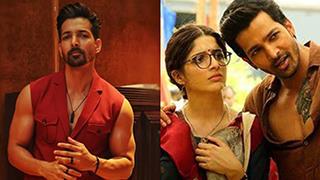Pakistani Stars Disappear from Bollywood Album Covers
In a noticeable development, prominent Pakistani actors such as Mahira Khan, Fawad Khan, and Mawra Hocane have had their images removed from the posters and covers of the Hindi film songs they once featured in. These removals are visible across platforms such as Spotify, YouTube Music, and others, impacting the visual representation of films like Raees, Kapoor & Sons, and Sanam Teri Kasam.
For instance, the poster of Raees—a blockbuster film starring Shah Rukh Khan and Mahira Khan—has been altered. Originally showcasing both leads, the new version now features only Shah Rukh Khan, with Mahira Khan's image omitted without formal explanation.
Mawra Hocane's Erasure Sparks Discussion
The changes began with the disappearance of Mawra Hocane from the album covers of Sanam Teri Kasam. While the music remains accessible, only her co-star Harshvardhan Rane now appears on the promotional artwork. When questioned about this, Harshvardhan responded with a touch of sarcasm:
“Now they will say that my PR team got this done! No, it’s just common sense, I assume. Weeding is being exercised.”
Adding to the mystery, Deepak Mukut, the producer of Sanam Teri Kasam, claimed ignorance about the change, saying:
“They didn’t ask me; it’s their decision. Whatever our government says, everyone has to follow.”
Fawad Khan's Presence Scrubbed from Key Projects
Fawad Khan, another celebrated Pakistani actor, has also faced digital censorship. The song Buddhu Sa Mann from the film Kapoor & Sons, which prominently featured Fawad alongside Sidharth Malhotra and Alia Bhatt, is currently unavailable for Indian audiences on YouTube. Users attempting to access it are met with a message stating, “Video unavailable. The uploader has not made this video available in your country.”
Additionally, Fawad’s image has been removed from the song’s cover art on music apps, despite the fact that he played a leading role in the film.
Interestingly, however, the poster for Khoobsurat, another romantic film in which Fawad starred opposite Sonam Kapoor, remains unchanged—for now.
Political Context: Operation Sindoor and Cultural Fallout
The removal of Pakistani talent from Indian digital platforms is not occurring in isolation. It follows India’s recent military actions, particularly Operation Sindoor, launched in retaliation to terrorist activities originating from across the border. The operation involved targeted strikes on terror camps located in Pakistan and Pakistan-occupied Kashmir (PoK).
In his public address, Indian Prime Minister Narendra Modi emphasized a decisive change in India’s stance toward Pakistan. He stated unequivocally that the country would no longer tolerate nuclear threats or terror-sponsored activities, declaring:
“Operation Sindoor is the new normal. The universities of terror won’t go unpunished.”
This hardline approach has translated into cultural and economic policies, including the banning of Pakistani content on streaming services, OTT platforms, and now, visibly, music applications.
Digital Platforms Reflect Government Sentiment
While these changes have not been officially confirmed as state-mandated, the pattern suggests compliance with the broader political climate. Music streaming platforms, likely under informal pressure or anticipating public backlash, appear to be distancing themselves from Pakistani associations in Bollywood.
This silent yet powerful digital boycott reflects a growing sentiment within India’s entertainment and media sectors—a desire to align with nationalistic values and steer clear of cross-border collaborations, at least for the time being.
Implications for Future India-Pakistan Cultural Collaborations
The latest developments raise pressing questions about the future of India-Pakistan artistic exchanges. While politics often drives temporary bans or restrictions, the long-term erasure of contributions by Pakistani artists could set a precedent that limits the scope of future collaborations.
Moreover, these removals not only affect the visibility of Pakistani actors but also rewrite the visual and cultural memory of Bollywood films that featured them. Fans on both sides of the border may find themselves caught in the crossfire of a larger diplomatic and ideological conflict.
Conclusion: A New Era of Cultural Separation
As diplomatic and military tensions escalate, so too does the divide in the cultural arena. The removal of Pakistani actors from Bollywood song posters and digital platforms is symbolic of a broader ideological shift—one that prioritizes national identity over artistic inclusivity.
While these actions may resonate with segments of the population calling for stricter measures against Pakistan, they also raise critical concerns about censorship, creative freedom, and the politicization of art. As India continues to reshape its geopolitical stance, the entertainment industry is poised to follow suit, adapting its content and collaborations to reflect the nation's evolving narrative.




















